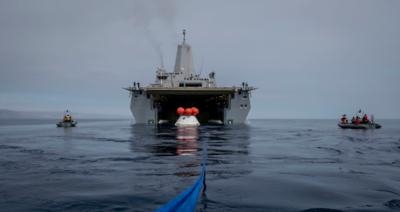Wed, Aug 06, 2014
Preparations Continue For December Test Flight
A test version of NASA's Orion spacecraft was floated inside the well deck of the U.S.S. Anchorage on Aug. 2, 2014, during recovery tests off the coast of California. A combined NASA and U.S. Navy team practiced recovery techniques over the weekend, in preparation for Orion's first trip to (and return from) space in Exploration Flight Test-1 (EFT-1) in December.

During that first underway recovery test in February, dynamic conditions caused activities to conclude before all of the test objectives were met. Since then, the team has been working on concepts that would allow them to safely recover Orion despite such conditions.
"During this test, the team will investigate alternative procedures and recovery methods," said Mike Generale, Orion Recovery Operations manager and Recovery Test director at NASA's Kennedy Space Center in Florida prior to the operation. "One of the goals of the test is to have a primary and alternate means of recovering the Orion crew module for Exploration Flight Test-1 later this year."
The Orion test vehicle was loaded into the well deck of the USS Anchorage (LPD 23), and the team headed out to sea off the coast of San Diego in search of sea conditions to support test needs. New support equipment developed for URT 2 accompanied the test vehicle.
New hardware includes an air bag system for the Crew Module Recovery Cradle and a load-distributing collar for placement around the crew module. The Prototype Laboratory at Kennedy designed a new device called the Line Load Attenuation Mechanical Assembly (LLAMA) that limits the tending-line forces for the Navy line handlers as Orion is guided into the ship's well deck.
Tending line snubbers, a kind of commercially available rubber shock absorbers sailors use for tending lines, also were tested. "Each of the new pieces of hardware will be evaluated for its relative merits, and the best solutions will be tested during URT 3 in September to discover the limits of their capabilities and suitability for Orion's Exploration Flight Test-1 in December," Generale said.
All of this testing ensures NASA can retrieve the Orion capsule safely because it helps the team understand how to adjust for various water conditions and contingency scenarios.
(Image provided by NASA)
More News
From 2023 (YouTube Version): Legacy of a Titan Robert (Bob) Anderson Hoover was a fighter pilot, test pilot, flight instructor, and air show superstar. More so, Bob Hoover was an i>[...]
Get The Latest in Aviation News NOW on Instagram Are you on Instagram yet? It's been around for a few years, quietly picking up traction mostly thanks to everybody's new obsession >[...]
Aero Linx: B-52H Stratofortress The B-52H Stratofortress is a long-range, heavy bomber that can perform a variety of missions. The bomber is capable of flying at high subsonic spee>[...]
Altimeter Setting The barometric pressure reading used to adjust a pressure altimeter for variations in existing atmospheric pressure or to the standard altimeter setting (29.92).>[...]
"Knowing that we play an active part in bettering people's lives is extremely rewarding. My team and I are very thankful for the opportunity to be here and to help in any way we ca>[...]
 Classic Aero-TV: Remembering Bob Hoover
Classic Aero-TV: Remembering Bob Hoover ANN FAQ: Follow Us On Instagram!
ANN FAQ: Follow Us On Instagram! ANN's Daily Aero-Linx (05.15.24)
ANN's Daily Aero-Linx (05.15.24) ANN's Daily Aero-Term (05.15.24):Altimeter Setting
ANN's Daily Aero-Term (05.15.24):Altimeter Setting Aero-News: Quote of the Day (05.16.24)
Aero-News: Quote of the Day (05.16.24)



